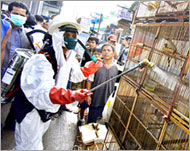Bird flu spreads in Indonesia
Bird flu has spread to Indonesia’s easternmost province of Papua, new laboratory tests have confirmed.

The confirmation on Tuesday that the H5N1 virus has spread further east came the same day as Indonesia reported that two teenagers in Jakarta had died of the disease.
The death of two 16-year olds, a boy and a girl on Monday and Tuesday, brings Indonesia’s total death toll from bird flu to 44 in the space of less than a year.
If this latest fatality is confirmed by the World Health Organisation, Indonesia will become the country with the most human deaths from the disease.
In Papua, samples were taken from about 30 chickens in the Mimika area after chickens from a local farm began to die in the second week of July, said Alexander Radjasa Pintadewa, the head of the Papua animal husbandry office.
“We have received the results of testings from the Bogor Veterinary Research Center, which said that three of the some 30 samples… were positively infected by the H5N1 virus strain,” he said.
Concerns
The virus has already been detected in 27 of the 33 provinces that make up the Indonesian archipelago.
The rising death toll has concerned experts who fear bird flu will continue infecting humans until more is done to prevent the virus from spreading in poultry.
“When you have trouble controlling infection among the chicken flocks, you are naturally going to see continuing infections among humans,” said Dr Anthony Fauci, infectious disease chief for the US National Institutes of Health.
“The more it circulates, the more you have an opportunity.”
‘Aggressive’ approach
Fauci, who visited southeast Asia last year, said Indonesia has not shown the same aggressive approach as Vietnam and Thailand in tackling the problem in poultry.
Vietnam has launched a mass vaccination campaign for poultry to stop the disease and Thailand has enforced rigid surveillance on affected villages and the mass slaughtering of infected birds.
However, Indonesia’s many local governments have refused to carry out mass mass poultry slaughters and vaccinations have been sporadic, Fauci said.
Confirmation
In Beijing, China confirmed its first human case of bird flu was detected in 2003, two years earlier than originally reported.
The development has raised concerns that other human bird flu infections may have occured in China before the end of 2005.
 |
|
Indonesia has been criticised for |
China’s health ministry said on Tuesday that laboratory tests carried out by the World Health Organisation confirmed that a Chinese man admitted to hospital in 2003 in the country had died from the lethal virus, Xinhua news agency reported.
The case first came to light when eight Chinese researchers published a letter in the New England Journal of Medicine in June, saying the 24-year-old man, originally treated for respiratory distress and pneumonia, had been infected with the H5N1 virus.
The man’s symptoms matched those of the lethal respiratory disease SARS when he was admitted, but had tested negative.
However, his virus samples genetically resembled H5N1 viruses taken from Chinese chickens in various provinces in 2004, the eight experts said.
Pandemic fears
The H5N1 virus made its first known jump to humans in Hong Kong in late 1997, but then largely disappeared until it re-emerged in parts of Southeast Asia in late 2003, killing three people in Vietnam.
Indonesia, Vietnam, Thailand and China remain the countries worst affected by the virus.
In China alone bird flu is known to have infected 19 people since last year, killing 12 of them, according to WHO.
Thailand has also had two fatal cases of the virus in the past two weeks, the WHO reported on Monday.
Health experts fear that the HN51 bird flu virus, currently passed from poultry to humans, could mutate and begin passing from human to human, sparking a pandemic capable of killing millions of people.